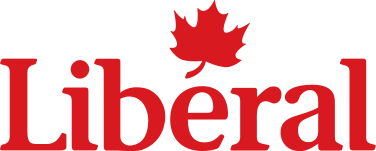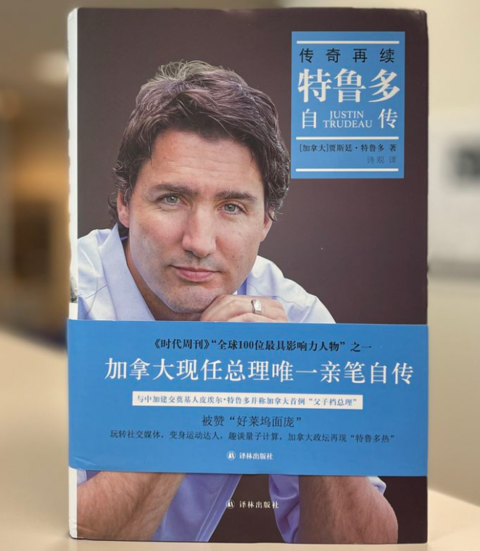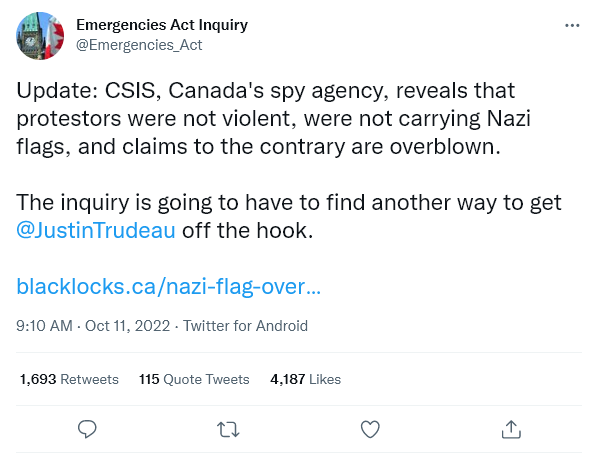It used to be said that the marketing department in any given organization was where the rubber met the sky (three drink minimum), but the Liberal convention in Barad-dûr-by-the-Rideau now owns that territory:
Once upon a time, Canada was led by a serious man named Pierre Elliot Trudeau. No matter what you think of his tenure as prime minister, there is no question that he took the job, and the country, seriously. Today his offspring, both biological and ideological, prance around the Canadian political landscape, smug and entitled and all the rest of it. But none of them has the foggiest idea of what they are doing with with the power they inherited, or why, or for what purpose.
[…]
For the evening entertainment on Friday, they brought out Jean Chrétien — another fantastically unserious person — to do his usual petit gars de Shawinigan routine. And did the old coot ever deliver, bragging yet again about keeping Canada out of Iraq, jabbing at Pierre Poilievre, and joking that he expects The Globe and Mail to call for a royal commission into Hillary Clinton showing up at the Liberal convention and interfering in Canadian elections.
Oh, our sides. They split. No matter that two days ago was World Press Freedom day. No matter that Friday also happened to be NNA night, where the Globe and Mail won nine awards. This is the Liberal convention after all, where one of the main policy proposals up for debate is a suggestion from the B.C. Liberals to essentially nationalise the news. Why not aim a few kicks at the media. The Liberals are paying for it anyway, aren’t they?
In his speech, Chrétien played to the latest Liberal idée fixe, which is that all of the party’s troubles since 2018 — from SNC Lavalin to WEgate to the egregious handling of Chinese interference — are all due to the clickbait chasing yellow journalists at the failing Globe and Mail.
For those of you who weren’t lucky enough to live through the nineties, Chrétien is the Liberal prime minister who brought you such hits as “what me worry?” about a Quebec referendum on secession; a joke about his PMO ordering the RCMP to pepper spray UBC students protesting his decision to invite a brutal dictator to dinner on their campus; and the Shawinigate and Adscam scandals, both of which are still routinely taught and referenced as case studies in ruling party greaseballery at its most unctuous.
But Liberals be Liberals. As National Post columnist Chris Selley noted: “This is deadly serious shit and this buffoon is playing it for laughs, just like [he] always played deadly serious shit.”
The “deadly serious shit” Selley had in mind is surely the river of scandal coursing through the Liberal Party in Ottawa over Chinese interference in Canadian politics, with tributaries flowing in from riding associations across the country, the Trudeau Foundation in Montreal, and numerous other parts of the Canadian political landscape. On Monday, the Globe and Mail reported on a CSIS analysis from 2021 which alleged that the family of Conservative MP Michael Chong was targeted by China’s security apparatus for unknown sanctions, in response to Chong’s sponsorship of a House of Commons motion calling China’s persecution of the Uighurs a genocide.
On Tuesday an understandably alarmed Chong was given an emergency briefing about the threat by CSIS director David Vigneault, in a meeting arranged by the prime minister.
This isn’t just about Michael Chong. Every member of parliament, every member of the government, should be up in arms over this. The Chinese diplomat in Canada involved, Zhao Wei, should have been sent home immediately, but Melanie Joly is still weighing the pros and cons.
As appalling as the targeting of Chong is in its own right, more scandalous still is the government’s response — equal parts utterly incompetent, unbelievably shady, and shamelessly partisan.
The scandal begins with the fact that Chong himself was never told about the CSIS report. Why is that? On Wednesday, the prime minister claimed it was because the threat identified in the CSIS report wasn’t deemed serious enough by the intelligence agency, so it never circulated outside of the agency. The first Trudeau had heard of this, apparently, was when he read about it in the newspaper.
But on Thursday, Michael Chong told the House of Commons that he’d been told, in a call from Trudeau’s current national security advisor Jody Thomas, that the report had actually made its way to the desk of one of her predecessors. When Trudeau was asked to explain this apparent contradiction on Friday, he said: “In terms of what I shared, I shared the best information I had at the time on Wednesday, both to Mr. Chong and to Canadians.” When asked who had given him this information, Trudeau declined to answer.
Look, we’ve seen this game before, countless times, with this government and this prime minister. Trudeau’s habit of responding to allegations of wrongdoing or incompetence or mismanagement by first denying any knowledge of the issue, then discrediting the source, and finally throwing unidentified third parties under the bus, is a well trod path for this deeply unserious man.
Given the pattern, we’re pretty skeptical of Trudeau’s claim that he’d been given incomplete information. Honestly, it wouldn’t surprise us in the slightest if it turns out that he just made the whole thing up.







